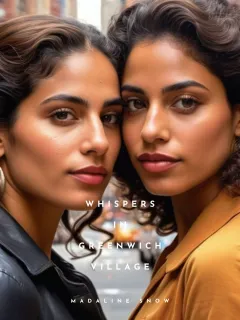Chapter 1: Exposure
Chapter 1: Exposure
The chemicals swirled like dark dreams across the photograph, revealing layers of life hidden beneath the surface. Elena Rodriguez moved with practiced precision, her hands steady despite the nervous energy coursing through her veins. Red light bathed the small darkroom, transforming the cramped space into a sanctuary of visual storytelling.
Another print emerged – an elderly woman sitting on a fire escape, her weathered hands clutching a cup of coffee, eyes fixed on something beyond the frame. Elena recognized Mrs. Ramirez from down the block, a woman who had survived more than most could imagine.
"Perfection isn't about capturing everyone's smile," her mentor Miguel had once told her. "It's about revealing the truth that lives between breaths."
The clock read 2:37 AM. Outside, the Lower East Side hummed with a restless energy that never truly slept. Elena pinned the latest print to dry, stepping back to assess her work. Each photograph was a fragment of a larger narrative – her narrative.
A soft knock interrupted her concentration.
"Come in," she called, carefully not moving to disturb the developing images.
Her younger brother Roberto pushed open the door, bringing with him a gust of late-night city air. "Again? Mom's going to have something to say about you being out this late."
Elena rolled her eyes. "Mom has something to say about everything."
Roberto leaned against the doorframe, his tall frame blocking what little additional light might have entered. "The newspaper called. Again."
She didn't need to ask which newspaper or what they wanted. Rejection had become as familiar to her as the chemical smell of the darkroom. "And?"
"They said your portfolio is 'interesting' but not what they're looking for right now." He emphasized the word "interesting" with air quotes, a gesture that made Elena smile despite herself.
"Interesting is code for 'we don't understand,'" she responded, carefully moving another photograph onto the drying rack.
The image captured a group of children playing soccer in a makeshift court between tenement buildings. Their joy was uncontainable – a moment of pure freedom that transcended the economic limitations surrounding them.
"You're going to make it," Roberto said, his voice carrying a mixture of certainty and hope. "Mamá just wants you to have a stable job. You know how she worries."
Elena knew all too well. Stable meant teaching. Stable meant marriage. Stable meant becoming someone else entirely.
"Photojournalism is stable," she argued, not for the first time. "Just not in the way she imagines."
Her current project was more than just photographs. It was a documentation of resilience – Puerto Rican communities in New York navigating a world that often seemed designed to push them to the margins. Each image told a story of survival, of dignity maintained against overwhelming odds.
Roberto approached, studying the photographs with a critical eye. Unlike their mother, he understood Elena's vision. "These are powerful," he murmured.
The moment was interrupted by the sound of a police siren cutting through the night. Both siblings tensed instinctively – a reaction born from years of living in a neighborhood where official protection felt more like a threat.
"I have a meeting with a small independent magazine tomorrow," Elena said, breaking the tension. "They're interested in a photo essay about community resilience."
"Independent magazine sounds like code for 'we can't pay you much,'" Roberto teased.
"Recognition isn't always about money," she retorted. "Sometimes it's about being seen. Really seen."
As the photographs continued to dry, Elena reflected on her journey. At twenty-five, she had already fought more battles than most. Being a woman. Being Puerto Rican. Being a photographer who refused to sanitize reality.
Her camera was her weapon. Her darkroom, her war room.
The images before her were more than just visual records. They were testimonies. Declarations of existence in a world that constantly tried to render certain communities invisible.
"I'm making them see us," she whispered, more to herself than to Roberto.
Her brother seemed to understand. He squeezed her shoulder – a gesture of solidarity that needed no words.
As dawn began to break, casting its first tentative light through the small window, Elena knew her day was just beginning. The photographs would need to be sorted, prepared, pitched. Another round of potential rejections awaited.
But something burned inside her. A conviction that went beyond mere professional ambition. This was about representation. About truth.
"Get some sleep," Roberto said, sensing her determination. "You can't change the world if you're exhausted."
Elena laughed. "Changing the world takes exactly that – exhaustion and persistence."
After Roberto left, she returned to her photographs. Each one a battle. Each one a story. Each one a piece of a larger truth she was determined to tell.
The city outside continued its endless dance – Puerto Rican families preparing for work, children getting ready for school, street vendors setting up their stands. Another day in the Lower East Side was beginning.
And Elena Rodriguez would be there to capture it, one frame at a time.
